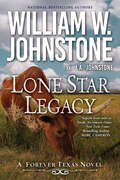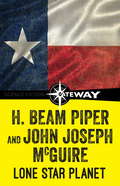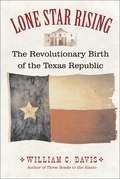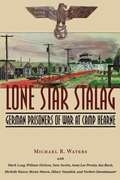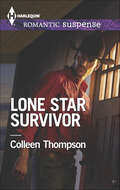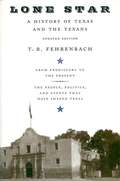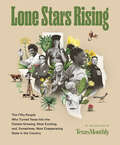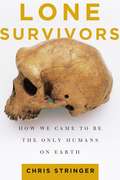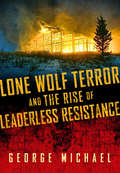- Table View
- List View
Lone Star Hero
by Jolene NavarroA Second Chance At Love Single mom Vickie Lawson is back in her Texas hometown, intent on making a better life for her children. But when her son's troubles lead childhood sweetheart Jake Torres to her door, she realizes her feelings for him never went away. Now a State Trooper, Jake vows not to be distracted by the beautiful woman who once held his heart. He's never revealed to her the secret that tore them apart. Jake fears if he does, she-and the whole town-will never forgive him. But if Vickie and Jake can untangle the past, they may have another chance at forever.
Lone Star Hero Love Stories: The Loyal Heart, An Uncommon Protector, and Love Held Captive (The Lone Star Heros' Love Stories #3)
by Shelley Shepard GrayThe Loyal HeartRobert Truax came to Galveston to fulfill his promise to a dying man and look after his widow. He didn&’t expect to find love in the unlikeliest of places.An Uncommon ProtectorOverwhelmed by the responsibilities of running a ranch on her own, Laurel Tracey decides to hire a convict—a man who&’s just scary enough to take care of squatters and just desperate enough to agree to a one year post.Love Held CaptiveAfter the War Between the States, a Confederate officer longs to heal the heart of a beautiful woman—but first he&’ll have to right the wrongs that were done to her.
Lone Star Holiday
by Jolene NavarroThe Prodigal Returns Twelve years ago, Lorrie Ann Ortega left the tiny town of Clear Water with stars in her eyes. Now she's back home-trying to live right and put her mistakes in the past. Even so, she'll never be the kind of woman who would make a good wife for the handsome widowed pastor, John Levi. But when she agrees to be nanny to his two sweet daughters, she's thrown constantly in his path. And she can't keep herself from dreaming that a man like John could one day love her. Can a prodigal daughter turn into a pastor's wife?
Lone Star Legacy: A New Historical Texas Western (A Forever Texas Novel #2)
by William W. Johnstone J.A. Johnstone"Superb from start to finish. An instant classic." —New York Times Bestselling Author Marc Cameron on Forever TexasExperience the gritty reality of life on the Texas frontier in this riveting historical adventure based on actual events and the true history of the legendary King Ranch, as one pioneering ranch family carves out their own piece of the American West… South Texas, 1854. Regis Royle is determined to turn eighteen-thousand acres of raw prairie into the greatest cattle ranch in the world. But he can&’t do it alone. The region is wilder than a herd of mustangs—and crawling with rustlers. Teaming up with the Cattlemen&’s Justice Consortium, Regis hopes to stop the rustling and start laying tracks for a new railway. Problem is, the cattlemen—including Jarvis &“Bone&” McGraw, Regis&’s own ranch manager—can&’t help but lock horns with the Texas Rangers. And it doesn&’t take long for this brewing pot of very bad blood to get a whole lot worse . . . First blood is spilled in Corpus Christie. Regis&’s reckless young brother Shep is wounded by the beautiful daughter of their fiercest enemies, the powerful Valdez family. The news of a possible rail line has divided the ranchers into warring factions. And Regis Royle has to keep the peace with McGraw, take a gamble with his business partner, and keep his wayward brother in one piece. But things really heat up when Regis learns that the Valdez family are claiming rights to the Royle Ranch&’s land. And they&’ll do anything to get it back. Even kill . . . The brothers Royle may be newcomers but they&’re no greenhorns. They&’ve got what it takes to be Texans. And that means never stop fighting for your dream.
Lone Star Loving (McLoughlin Trilogy #2)
by Martha HixPASSION TEMPTED HERCharity McLoughlin had gotten herself into another mess. Her wealthy family had disowned her, her purse was empty—and worst of all, she'd been tricked into smuggling Texas silver into Mexico. Now the law was after her. She wasn't sure whether being abducted by a ruggedly handsome stranger who called himself Hawk meant her fortunes were looking up or down. The one thing she didn't doubt was the fiery attraction she felt for this hard-muscled man. Perhaps she wouldn't try to get away just yet. Instead, maybe for just one night, she would surrender to the raging desires that his slightest touch stirred in her . . .DESIRE ENSLAVED HIMDavid Fierce Hawk had decided long ago that he'd take one of the McLoughlin daughters as his wife because of the kindness and beauty he'd seen in their mother. But he wasn't sure he wanted this daughter—Charity, the blue-eyed hellcat he'd agreed to bring back to the family fold. She was certainly in a good deal of trouble. And Hawk had been betrayed by those he'd tried to help before, including his Osage Indian tribesmen. But for now, he was willing to forget the future. He was alone with Charity under the starry Texas skies, and his lustful thoughts could not be denied. He'd not pass up this chance to twine his hands through her glorious sable locks, and sample the lush pleasures that this wild and lovely woman offered. . . . Praise for Martha Hix"A romantic mixture of sensitivity, humor and spice, Martha Hix's delicious love story offers a refreshingly atypical heroine.”—RT Book Reviews, 4 Stars, on Terrific Tom "Hix pens a fast-paced gem filled with playful repartee, a vivacious heroine and a dreamy hero that will make readers sigh with delight.”—RT Book Reviews, 4 Stars, on What to Do about Baby “Filled with humor . . . and a wealth of love. Enjoy!”—RT Book Reviews on Magic and the Texan “An entertaining book that combines mysticism with danger.”—RT Book Reviews on Destiny’s Magic“Martha Hix has given an Arabian Nights tale a new twist, with an unusual genie and plenty of Civil War action.”—RT Book Reviews on River Magic
Lone Star Marine: A Biography Of The Late Colonel John W. Thomason, Jr., U.S.M.C.
by Col. Roger Willcock U.S.M.R.A fascinating biography of veteran Marine Corps officer Colonel John W. Thomason, dedicated soldier and talented artist."On a spring morning in 1917, in fact the very day the United States declared war on Germany, a twenty-four-year-old Texan strode into the recruiting office of the Marine Corps branch of the Texas Naval Militia at Houston, and let it be known somewhat emphatically to authority there present that he desired to enlist. They assigned him to Company A, 1st Texas Battalion of Marines, and the same day they packed him off on the first train through town bound for New Orleans."Within a month's time he was appointed a Second Lieutenant in the United States Marine Corps, and for the ensuing twenty-seven years he was to devote his life to that branch of the naval service. During those years he served within the continental limits of the United States, in France and Germany, aboard ship and ashore in the Caribbean, in Cuba, in certain of the Central American Republics, in the Orient, and briefly in the South Pacific."This newly-commissioned young officer, John William Thomason, Jr., of Huntsville, Texas, brought with him into the Marine Corps a variety of skills and talents. Throughout his service career he was to continue to employ his unusual abilities and to develop them and to contribute materially not only to the betterment of his Corps but also to his fellow comrades. He was unique in a service where uniqueness is not unknown but rather wherein individuality is encouraged for the common good. His record in combat as well as in the administrative field was outstanding in a military organization long known to demand perfection as a matter of course. And at his death in 1944, it would appear he left the artistic, the literary, and the military worlds far wealthier than he had found them."
Lone Star Nation: How Texas Will Transform America
by Richard ParkerA provocative and eye-opening look at the most explosive and controversial state in America, where everything is bigger, bolder--and shaping our nation's future in surprising ways To most Americans, Texas has been that love-it-or-hate it slice of the country that has sparked controversy, bred presidents, and fomented turmoil from the American Civil War to George W. Bush. But that Texas is changing--and it will change America itself. Richard Parker takes the reader on a tour across today's booming Texas, an evolving landscape that is densely urban, overwhelmingly Hispanic, exceedingly powerful in the global economy, and increasingly liberal. This Texas will have to ensure upward mobility, reinvigorate democratic rights, and confront climate change--just to continue its historic economic boom. This is not the Texas of George W. Bush or Rick Perry. Instead, this is a Texas that will remake the American experience in the twenty-first century--as California did in the twentieth--with surprising economic, political, and social consequences. Along the way, Parker analyzes the powerful, interviews the insightful, and tells the story of everyday people because, after all, one in ten Americans in this century will call Texas something else: Home.
Lone Star Nation: The Epic Story of the Battle for Texas Independence
by H. W. BrandsPulitzer Prize finalist H. W. Brands demythologizes Texas's journey to statehood and restores the genuinely heroic spirit to a pivotal chapter in American history. From Stephen Austin, Texas's reluctant founder, to the alcoholic Sam Houston, who came to lead the Texas army in its hour of crisis and glory, to President Andrew Jackson, whose expansionist aspirations loomed large in the background, here is the story of Texas and the outsize figures who shaped its turbulent history. Beginning with its early colonization in the 1820s and taking in the shocking massacres of Texas loyalists at the Alamo and Goliad, its rough-and-tumble years as a land overrun by the Comanches, and its day of liberation as an upstart republic, Brands' lively history draws on contemporary accounts, diaries, and letters to animate a diverse cast of characters whose adventures, exploits, and ambitions live on in the very fabric of our nation.
Lone Star Planet
by H. Beam Piper John Joseph McguireNew Texas: its citizens figure that name about says it all. The Solar League ambassador to the Lone Star Planet has the unenviable task of convincing New Texans that a s'Srauff attack is imminent, and dangerous. Unfortunately it's common knowledge that the s'Srauff are evolved from canine ancestors - and not a Texan alive is about to be scared of a talking dog! But unless he can get them to act, and fast, there won't be a Texan alive, scared or otherwise!
Lone Star Rising: The Revolutionary Birth Of The Texas Republic
by William C. DavisAll Americans, not just Texans, remember the Alamo. But the siege and brief battle at that abandoned church in February and March 1836 were just one chapter in a much larger story -- larger even than the seven months of armed struggle that surrounded it. Indeed, three separate revolutionary traditions stretching back nearly a century came together in Texas in the 1830s in one of the great struggles of American history and the last great revolution of the hemisphere. Anglos steeped in 1776 fervor and the American revolution came seeking land, Hispanic and native Americans joined the explosion of republican uprisings in Mexico and Latin America, and the native tejanos seized on a chance for independence. As William C. Davis brilliantly depicts in Lone Star Rising, the result was an epic clash filled not just with heroism but also with ignominy, greed, and petty and grand politics. In Lone Star Rising, Davis deftly combines the latest scholarship on the military battles of the revolution, including research in seldom used Mexican archives, with an absorbing examination of the politics on all sides. His stirring narrative features a rich cast of characters that includes such familiar names as Stephen Austin, Sam Houston, and Antonio Santa Anna, along with tejano leader Juan Seguín and behind-the-scenes players like Andrew Jackson. From the earliest adventures of freebooters, who stirred up trouble for Spain, Mexico, and the United States, to the crucial showdown at the San Jacinto River between Houston and Santa Anna there were massacres, misunderstandings, miscalculations, and many heroic men. The rules of war are rarely stable and they were in danger of complete disintegration at times in Texas. The Mexican army often massacred its Anglo prisoners, and the Anglos retaliated when they had the chance after the battle of San Jacinto. The rules of politics, however, proved remarkably stable: The American soldiers were democrats who had a hard time sustaining campaigns if they didn't agree to them, and their leaders were as given to maneuvering and infighting as they were to the larger struggle. Yet in the end Lone Star Rising is not a myth-destroying history as much as an enlarging one, the full story behind the slogans of the Alamo and of Texas lore, a human drama in which the forces of independence, republicanism, and economics were made manifest in an unforgettable group of men and women.
Lone Star Sports Legends: On This Day in History (On This Day In)
by Ryan SprayberryFrom the clash of college to the best married shooting duo in history, the Lone Star State clears every hurdle the sports world offers. A former Texas Christian basketball player became the first tenured African American professor at Harvard Business School. Aggie football legend John Kimbrough�s first professional contract required him to act in movies and serve as the stadium�s handyman. For every date on the calendar, Ryan Sprayberry provides a play-by-play of 365 memorable days in the state�s athletic history, beginning with the birth of the Cotton Bowl on January 1, 1937, and ending with the final snap of the Ice Bowl on December 31, 1967.
Lone Star Stalag: German Prisoners of War at Camp Hearne
by Michael R. Waters Michelle J. Raisor Hilary Standish Sam Sweitz Mark A. Long William Dickens Willi Nellessen Ian Buvit Norbert Dannhaeuser Anna Lee Presley Bryan MasonBetween 1943 and 1945 nearly fifty thousand German prisoners of war, mostly from the German Afrika Korps, lived and worked at seventy POW camps across Texas. Camp Hearne, located on the outskirts of rural Hearne, Texas, was one of the first and largest German prisoner-of-war camps in the United States. Waters and his research team tell the story of the five thousand German soldiers held there during World War II. The book reveals the shadow world of Nazism that existed in the camp, adding darkness to a story that is otherwise optimistic and in places even humorous.
Lone Star Survivor
by Colleen ThompsonA soldier's memories are more dangerous than anything he's encountered in the line of duty "Killed in action" a year ago, US Army captain Ian Rayford shocks everyone when he stumbles half-dead onto his family's Texas ranch. Suffering from post-traumatic stress disorder, Ian can barely remember his relatives. His former fiancée, a psychologist specializing in PTSD, arrives to help Ian recover. But not everyone wants her to unearth the dangerous secrets he's carrying. Now engaged to another man, Dr. Andrea Warrington fights her feelings for Ian even as she helps him remember how much they once loved each other. Yet the closer Ian gets to his past, the more someone else has to ensure the treacherous truth stays buried.
Lone Star: A History of Texas and the Texans
by T. R. FehrenbachHere is an up-to-the-moment history of the Lone Star state, together with an insider's look at the people, politics, and events that have shaped Texas from the very beginning. Never before has the story been told with more vitality and immediacy. Fehrenbach re-creates the Texas saga from prehistory, to the Spanish and French invasions, to the heyday of the cotton and cattle empires. He dramatically describes the emergence of Texas as a republic, the vote for secession before the Civil War, and the state's readmission to the Union after the War. In the twentieth century oil would emerge as an important economic resource, and the state would experience significant social change. But Texas would remain unmistakably Texas, because Texans "have been made different by the crucible of history; they think and act in different ways, according to the history that shaped their hearts and minds." This is the updated 2000 edition.
Lone Star: A History of Texas and the Texans
by T. R. FehrenbachThe definitive account of the incomparable Lone Star state by the author of Fire & Blood: A History of Mexico. T. R. Fehrenbach is a native Texan, military historian and the author of several important books about the region, but none as significant as this work, arguably the best single volume about Texas ever published. His account of America's most turbulent state offers a view that only an insider could capture. From the native tribes who lived there to the Spanish and French soldiers who wrested the territory for themselves, then to the dramatic ascension of the republic of Texas and the saga of the Civil War years. Fehrenbach describes the changes that disturbed the state as it forged its unique character. Most compelling is the one quality that would remain forever unchanged through centuries of upheaval: the courage of the men and women who struggled to realize their dreams in The Lone Star State.
Lone Star: A History of Texas and the Texans
by T. R. FehrenbachThe definitive account of the incomparable Lone Star state by the author of Fire & Blood: A History of Mexico. T. R. Fehrenbach is a native Texan, military historian and the author of several important books about the region, but none as significant as this work, arguably the best single volume about Texas ever published. His account of America's most turbulent state offers a view that only an insider could capture. From the native tribes who lived there to the Spanish and French soldiers who wrested the territory for themselves, then to the dramatic ascension of the republic of Texas and the saga of the Civil War years. Fehrenbach describes the changes that disturbed the state as it forged its unique character. Most compelling is the one quality that would remain forever unchanged through centuries of upheaval: the courage of the men and women who struggled to realize their dreams in The Lone Star State.
Lone Star: A Story of the Texas Rangers
by Kathleen V. KudlinskiIn 1847, eleven-year-old Clay dreams of becoming a Texas Ranger so that he can exact revenge upon the Comanche Indians who attacked his family, until personal experience acquaints him with the brutal reality of Ranger activities.
Lone Stars Rising: The Fifty People Who Turned Texas Into the Fastest-Growing, Most Exciting, and, Sometimes, Most Exasperating State in the Country
by Editors of Texas MonthlyIn celebration of the fiftieth anniversary of Texas Monthly, a collection of original essays and portraits of fifty groundbreaking Texans who have shaped the Lone Star State—and the nation—over the past half century. With a population of twenty-nine million, Texas has birthed some of America’s most innovative, culture-altering politicians, entertainers, athletes, and activists of the last five decades. In Lone Stars Rising, the editors of Texas Monthly select fifty of the most trailblazing Texans who have shaped the Lone Star State and America today.Organized by decade and featuring essays from the magazine’s legendary roster of contributors, accompanied by drawings and fifty photographs throughout, this collection includes incisive commentary on the stars whose rise from Texas to the world stage has been meteoric, as well as the lesser-known individuals who have been toiling on the sidelines, quietly and intentionally shaping the way we think and talk about the Texas that exists today.Coinciding with the fiftieth anniversary of Texas Monthly, Lone Stars Rising is the quintessential ode to the Lone Star State in all its complexity.
Lone Survivor
by Ken HodgsonKen Hodgson, an authentic, powerfully original voice in Western fiction, returns with the most notorious story in the annals of the frontier ... In 1873, Alferd Packer led 21 men from Utah to the gold fields of Colorado. Three months later, he came back to civilization alone, guarding the terrible secret of what he had done there. To this day, no one knows what really happened on that fateful expedition ... except Packer himself. LONE SURVIVOR brilliantly recreates - from Packer's unique point of view - a tale of unforgiving terrain, of savage winter storms and dwindling food supplies, and of a desperate journey into the wilderness, where brave men died and he crossed a line few dare to cross ... Historical fiction.
Lone Survivors: How We Came to Be the Only Humans on Earth
by Chris StringerIn this groundbreaking and engaging work, world-renowned paleoanthropologist Stringer sets out a new theory of humanity's origin, offering the definitive account of who and what we were, and a work that will change perceptions about our origins and about what it means to be human.
Lone Voyager: The Extraordinary Adventures Of Howard Blackburn Hero Fisherman Of Gloucester
by Joseph E. GarlandLike countless Gloucester fishermen before and since, Howard Blackburn and Tom Welch were trawling for halibut on the Newfoundland banks in an open dory in 1883 when a sudden blizzard separated them from their mother ship. Alone on the empty North Atlantic, they battled towering waves and frozen spray to stay afloat. Welch soon succumbed to exposure, and Blackburn did the only thing he could: He rowed for shore. He rowed five days without food or water, with his hands frozen to the oars, to reach the coast of Newfoundland. Yet his tests had only begun.So begins Joe Garland's extraordinary account of the hero fisherman of Gloucester. Incredibly, though Blackburn lost his fingers to his icy misadventure, he went on to set a record for swiftest solo sailing voyage across the Atlantic that stood for decades. Lone Voyager is a Homeric saga of survival at sea and a thrilling portrait of the world's most fabled fishing port in the age of sail.--Print Ed.
Lone Warrior
by Bobbi SmithPoised for the adventure of a lifetime in the rugged West, Marissa Williams quickly learned how untamed the frontier could be as a party of raiding Comanche snatched her from her chaperone and spirited her away to their village. Once there, they stripped her of her clothes and sent her to a tipi to await her fate. When a virile, broad-shouldered warrior entered, she feared the worst. But his green eyes calmed her fears, and then his searing kiss inflamed a passion that set her shaking all over again. Heart's Surrender understood her fright, longed to soothe her trembling. For Wind Ryder, more than anyone, knew what being a captive of the Comanche meant. Since he had been taken many springs ago, he'd strived to forget his past and become the best of the warriors. The chief's gift of the blond beauty proved his prowess, but her silky skin and tender lips also haunted his dreams. Dreams that made Wind Ryder realize Marissa was the fiercest fighter of them all, for she had battled for his heart ... and won.
Lone Wolf
by Michael NewtonA werewolf contends with love and hunger while fighting for the Confederacy during the Civil War in this romantic fantasy. Graham is on the run. Running from a civil war that he was forced into, from the beast that lies hidden within him, and from the curse that keeps him from leading a normal life. When Graham meets Eliza, a mere human, he falls deeply in love. But could she possibly love him once she discovers his ability to transform into the beast? Can Graham tame the beast inside him and live a normal life, or will his secrets tear apart the growing love between he and Eliza?
Lone Wolf Terror and the Rise of Leaderless Resistance
by George MichaelOn July 22, 2011, Anders Behring Breivik detonated a car bomb in downtown Oslo, Norway. He didn't stop there, traveling several hours from the city to ambush a youth camp while the rest of Norway was distracted by his earlier attack. That's where the facts end. But what motivated him? Did he have help staging the attacks? The evidence suggests a startling truth: that this was the work of one man, pursuing a mission he was convinced was just.If Breivik did indeed act alone, he wouldn't be the first. Timothy McVeigh bombed a federal building in Oklahoma City based essentially on his own motivations. Eric Robert Rudolph embarked on a campaign of terror over several years, including the Centennial Park bombing at the 1996 Olympics. Ted Kaczynski was revealed to be the Unabomber that same year. And these are only the most notable examples. As George Michael demonstrates in Lone Wolf Terror and the Rise of Leaderless Resistance, they are not isolated cases. Rather, they represent the new way warfare will be conducted in the twenty-first century.Lone Wolf Terror investigates the motivations of numerous political and ideological elements, such as right-wing individuals, ecoextremists, foreign jihadists, and even quasi-governmental entities. In all these cases, those carrying out destructive acts operate as "lone wolves" and small cells, with little or no connection to formal organizations. Ultimately, Michael suggests that leaderless resistance has become the most common tactical approach of political terrorists in the West and elsewhere.
Lone Wolf Terror and the Rise of Leaderless Resistance
by George MichaelOn July 22, 2011, Anders Behring Breivik detonated a car bomb in downtown Oslo, Norway. He didn't stop there, traveling several hours from the city to ambush a youth camp while the rest of Norway was distracted by his earlier attack. That's where the facts end. But what motivated him? Did he have help staging the attacks? The evidence suggests a startling truth: that this was the work of one man, pursuing a mission he was convinced was just. If Breivik did indeed act alone, he wouldn't be the first. Timothy McVeigh bombed a federal building in Oklahoma City based essentially on his own motivations. Eric Robert Rudolph embarked on a campaign of terror over several years, including the Centennial Park bombing at the 1996 Olympics. Ted Kaczynski was revealed to be the Unabomber that same year. And these are only the most notable examples. As George Michael demonstrates in Lone Wolf Terror and the Rise of Leaderless Resistance, they are not isolated cases. Rather, they represent the new way warfare will be conducted in the twenty-first century.Lone Wolf Terror investigates the motivations of numerous political and ideological elements, such as right-wing individuals, ecoextremists, foreign jihadists, and even quasi-governmental entities. In all these cases, those carrying out destructive acts operate as "lone wolves" and small cells, with little or no connection to formal organizations. Ultimately, Michael suggests that leaderless resistance has become the most common tactical approach of political terrorists in the West and elsewhere.



